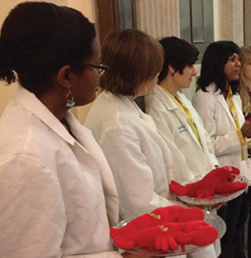As the Massachusetts Department of Public Health deliberates the exact shape of a rule change allowing industry-sponsored meals for physicians in speaker programs, pharma foes and industry advocates are squaring off over the definition of “modest meals and refreshments.”
Medical students wielding lobster stuffed animals and fake cocktails on silver trays congregated in front of the State House on Friday ahead of a hearing on the rule, at which several gave testimony. The students, from Harvard and Boston University and organized by the American Medical Student Association, National Physicians’ Alliance and Health Care for All, presented a petition addressed to Gov. Deval Patrick urging that his administration set a clear monetary limit on allowable meals and refreshment, ban provision of alcoholic drinks during educational meetings and include a reporting mandate requiring disclosure of how much industry spends on events.
“We’re ultimately advocating for no meals, but since the legislature did pass this allowance for ‘modest meals,’ we’re asking the Department of Public Health to ensure a monetary cap in line with per diem requirements for federal and state employees,” said Reshma Ramachandran, an AMSA PharmFree fellow. Ramachandran said that would limit meals to $25-$50 per plate.
Most of the state’s hospitals and academic medical centers have policies prohibiting their faculty from accepting meals at off-site meetings, said Ramachandran, but those policies don’t apply to adjuncts. AMSA is also worried about the possibility that the Sunshine Act components of the Affordable Care Act, which mandate annual disclosure of gifts to physicians, will be interpreted as preempting Massachusetts’ law, which has more stringent quarterly reporting requirements and, unlike federal law, requires reporting on gifts to nurse practitioners and physician assistants as well as the physicians themselves.
In July, the Massachusetts Legislature repealed a ban on industry-funded meals provided to physicians and other healthcare professionals as part of non-accredited CME – a liberalization of the Commonwealth’s 2008 drug and device manufacturer conduct law that the restaurant and biopharma industries had lobbied hard for. Gov. Patrick said the liberalization “will afford health care providers some flexibility to be educated on new clinically relevant products and allow them to stay informed on advancements in pharmaceuticals and medical devices that benefit patients and lower our health care costs.”
In September, the state issued a draft revision defining “modest meals and refreshments” as “food and/or drinks provided by or paid for by a pharmaceutical or medical device manufacturing company or agent to a health care practitioner that, as judged by local standards, are similar to what a health care practitioner might purchase when dining at his or her own expense.” On Nov. 14, the Massachusetts Public Health Council will vote to finalize the rule, which will take effect Dec. 7. The Council is accepting public comments through tomorrow.
In testimony on Friday, MassBio chief Robert Coughlin praised the rule change and said “the definition [of ‘modest means and refreshments’] is both consistent with – and in fact more stringent than – the PhRMA Code’s guidance on meals to be offered at educational speaker programs” and “plainly achieves the directives of the underlying law, which require the Department’s code to be ‘no less restrictive’ than the PhRMA and AdvaMed Codes.”
PhRMA said in comments that it “appreciates that the definition provides a flexible standard for determining whether a meal is modest, rather than a single dollar ceiling on the cost of the meal. This flexibility is important given that the value of a modest meal may differ depending on the venue and type of meal.” However, the trade group expressed concern that it “could be misinterpreted by some manufacturers as requiring them to conduct an individual assessment as to whether the costs of a particular meal are consistent with what each attendee would pay if dining at his or her own expense,” and advised that the definition refer to “what a typical healthcare practitioner might purchase.”
Harvard pathologist David Korn, MD said the definition should be narrowed “in a manner that is conducive to legitimate medical education rather than conducive to softening up the audience to enhance their receptivity to promotional sales pitches,” or more precisely, “the kinds of meals that may be served in hospitals or doctors offices in conjunction with legitimate educational and training events.”
Coalition for Healthcare Communication’s John Kamp argued that “company-sponsored speaker programs are critical to the safe and effective use of medicines and devices,” and noted that FDA requires such programs for some drugs as part of Risk Evaluation and Mitigation Strategy programs.
“The laws for the federal and state governments – including that of Massachusetts – and the internal policies of companies are stringent and work to ensure that these programs are both educational and in accordance with good care,” said Kamp.








